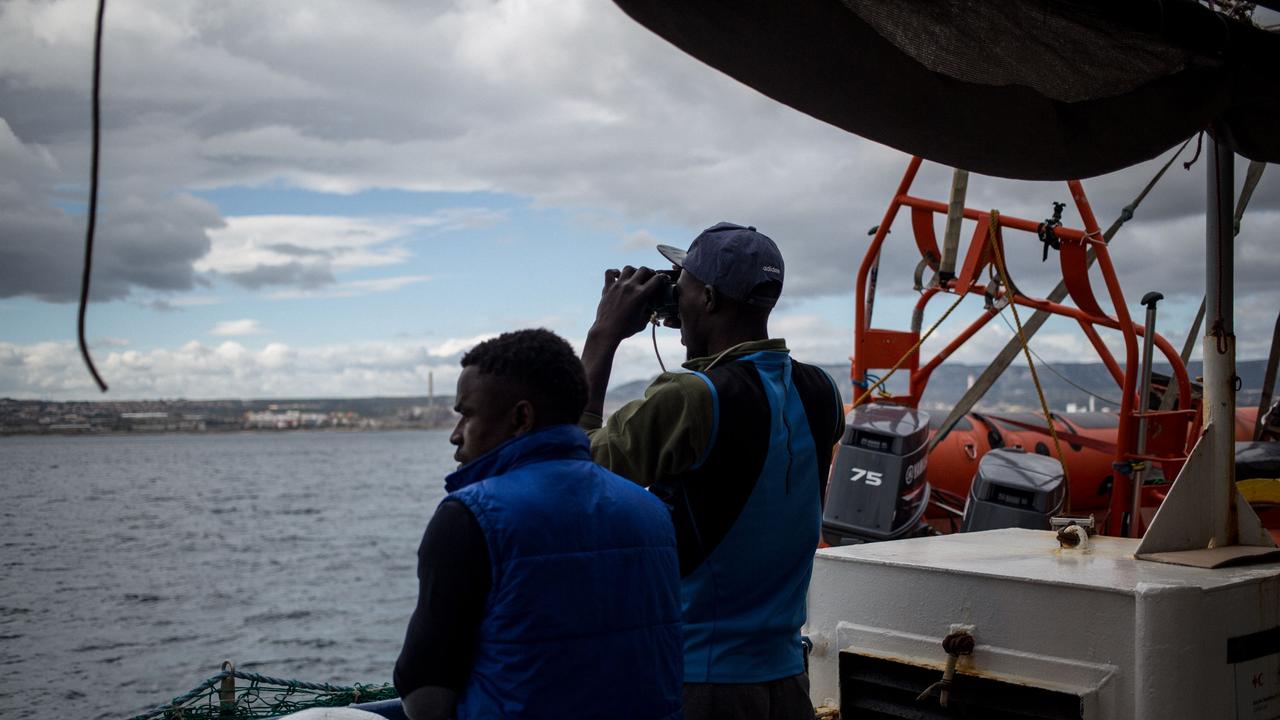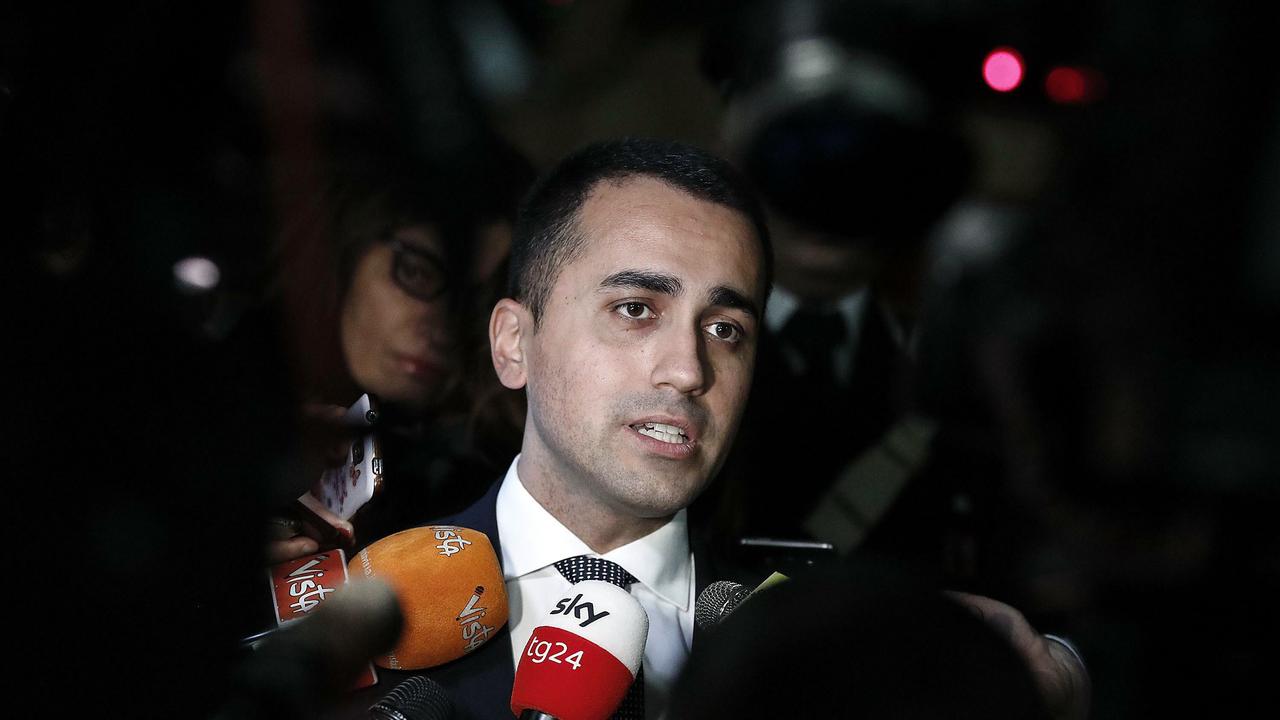Europe’s migrant crisis: Desperate race towards promise of peace
The first choke point for Syrian refugees is Lesbos, two hours’ boat ride from mainland Turkey.

There’s not a minute to waste. After splashing on to the pebble beach, Maher Fattah is walking as fast as his legs will carry him to the big blue and white ferry waiting in distant Mitilini.
He won’t stop long to talk. “You must keep up,” he says. “We cannot wait here.”
The urgency is etched on the face of the little girl whose hand he is holding. Her name is Sana and, like Fattah, she’s part of the exodus taking place across the Middle East, born of desperation and the gut-wrenching certainty that there is no going back.
The first choke point is the Greek holiday island of Lesbos, two hours’ boat ride across a glistening strait from mainland Turkey. Hungary is the next.
More than 40,000 refugees are expected to cross — or attempt to cross — its border from Serbia over the next week. Hungary is preparing to close the border to anybody without papers within days. A sense of desperation and panic is spreading across Europe.
On Tuesday night, Fattah, 28, climbed into a nine-metre launch with Sana — the daughter of friends — and a dozen other asylum-seekers from Syria. They were told by the Turk at the helm to keep quiet.
Fattah thinks they left from a landing near the Turkish port of Ayvalik, a hub for the people smugglers who charged $US1200 ($1700) for his seat and $US600 for Sana. Just before dawn, the boat stopped 50m off the rocky point at Kratigos, close to the airport where the early flights were landing on Lesbos.
The group was told to swim for the inky shoreline. All made it, and after those long, despairing months on the road Fattah took a moment to savour his arrival on European soil.
But only a moment.
“We cannot afford to rest,’’ he explains when we chance across the little group trudging through the midday heat on the road to Mitilini, the island’s capital.
They have kilometres and kilometres to go. The drivers speeding by barely give the asylum-seekers a second glance. “I am very tired,” he says in his precise English. “I left Syria six months ago, walked to Iraq, then Turkey, now here. I feel I must hurry because there are so many others coming. I saw them.”
Fattah is hoping to reach Germany in the next week, and he’s far from alone. More than 20,000 Middle Eastern asylum-seekers are sleeping rough on Lesbos, clamouring to get on one of the packed ferries that leave two or three times a day for Piraeus, the main port of Athens, and next stop on the journey to a new life in prosperous northern Europe.
Pity the Greeks. Containing the influx is like bailing a leaky boat with a fork: for every would-be refugee who is moved on, another arrives. Compassion for the Syrians, in particular, is running low on Lesbos as a disastrous tourist season for the islanders bleeds into the autumn doldrums.
The locals voice their anger most nights in noisy demonstrations along the Mitilini waterfront. “Lesbos is Greece,” they chant. This week, Greek Interior Minister Yiannis Mouzalas warned that the community was “on the verge of explosion”.
Protester Nick Apostolidis, 34, says people feel sorry for the refugees, but there is a limit, and Lesbos has hit it. “There is so much garbage lying around that we are worried about the health of our children,’’ he says.
A second port has been opened to shift the backlog, but progress is grindingly slow. The rate of arrivals is accelerating, driven by the fear of asylum-seekers that the sanctuary recently offered by Germany and Austria will not last.
At the same time, the people smugglers have dramatically dropped their prices, possibly as an economy of scale kicks in with so many on the move to Europe, either directly from Syria or from the crowded refugee camps in Turkey, Lebanon, Syria and Iraq that shelter millions.
Fattah said he was told a year ago that passage would cost €12,000 a head ($19,000), “a crazy thing”. But when the price came down, his family sold everything they had, raided the last of their savings and put him on the long march that reaches through Greece, Macedonia, Serbia and Hungary.
Already, the Austrians have said there is a limit to how long they can keep the border with Hungary open, and cancelled the special trains put on to transport asylum-seekers.
The Hungarians, for their part, have pointed to next Tuesday, September 15, as a possible cut-off date, marking the due completion of the controversial razor fence along its border with Serbia. Troops may also be deployed by Hungary to seal that frontier.
But the office of the UN High Commissioner for Refugees says another 42,000 people are expected to arrive at the Hungarian border in the coming days, headed for Germany and Sweden.
Denmark, alarmed by the arrival of 3200 Middle Eastern asylum-seekers this week, has closed a major ferry route and curtailed train services.
Fattah says the information networks used by asylum-seekers are alive with rumours that the gate to Europe is about to be bolted shut. One of his few possessions is an old Nokia phone, which he uses to tap in to the latest on border crossings and the best cross-country routes.
The young man has been living vicariously since he left his home town of Kobane, close to the Syrian border with southern Turkey and a battleground with Islamic State for the past 11 months.
He was working as a barman in Damascus, taking advantage of his English, when fighting in the Syrian capital erupted and forced him to return to Kobane. When the war followed him there, his family realised they all had to get out. They raised the money for him to leave for Europe; once set up, he would find a way for the others to join him.
Mostly, he walked. “From morning to night, I used these,’’ he says, pointing to his feet. “I would buy bread, sleep where I could. I was always dirty.’’ When he reached Istanbul, an important way point for Syrian asylum-seekers, he reached out to a man named Benny.
Fattah describes him as an “organiser”. Benny told him to bring the cash to an Istanbul park and be ready to leave immediately. The place is so well known it is mockingly called “Syrian gardens”.
Fattah says he was referred to Benny but it was hardly necessary. “These people aren’t hard to find … the details are on the internet,’’ he says.
A mini-van took him, his friend Qahrman, Sana and her parents south to the jump-off point for the boat to Lesbos. He can’t or won’t say exactly where it was, explaining it was pitch black when they boarded. He still has Benny’s number in his phone, though.
Sure enough, the people smuggler picks up when Fattah dials it at our request. The exchange in Arabic is fast and furious, the upshot being that Fattah should not call again. “He said he got us here, and that was it … leave him alone.”
On Lesbos, the rising tension is not only between the locals and Syrians who sleep and cook on the sidewalks. Other groups of Middle Eastern asylum-seekers bitterly resent the focus on the Syrians. Take this confrontation between Afghani Reeza Husseini and a Medecins Sans Frontieres official in the carpark of Mitilini port where people congregate, waiting for the next ferry. The baking bitumen is dotted with tents and reeking garbage.
Angrily, the 21-year-old demands that a doctor see his brother, Mashhad, who is slumped in a chair, panting in the heat; “he is not passing water”, he complains. Originally from Kabul, they grew up in Iran. But there was nothing there for them, “no work, no future”, so when they heard people were getting into Europe, they left.
Like Fattah, they paid a middle man in Istanbul to cross to Lesbos and EU territory, landing on Tuesday, around the same time as the Syrian group. “We want to go to Germany,’’ Reeza says emphatically. “Everyone is saying they want to help the Syrians. They say the Syrians are dying … when we Afghans are dying. We never stopped dying from the war.’’
First call for new arrivals on Lesbos is to register for transit papers with the Greek police. This can take weeks, and the asylum-seekers are largely left to their own devices in the interim. The resources of non-government organisations such as MSF have been overwhelmed, though food and water is being distributed.
Children in anxious need of the portable toilets hop from foot to foot in the long queues.
Some asylum-seekers have enough money to eat in restaurants, yet that’s hardly consolation for local businesses after their season was wrecked by the boat arrivals. At the Coffee Happy House in Mitilini, a table of young Syrian men order plates of potato chips and water, then monopolise the toilet. The waitress says huffily in English: “This is not a hostel.”
Khan Hashimi sold his watermelon farm outside of Kunduz, northern Afghanistan, to pay his way to Lesbos. He is down to his last €20, €40 short of the price of the ticket to Piraeus and he is hoping there will be free berths on the ferry due out at 1pm today. “I cannot stay here,” he says, begging for help.
In the face of such desperation it’s hard to know what to say or do — the dilemma confronting the world as the fallout of nearly 15 years of post 9/11 war and chaos in the Middle East washes up on Europe’s doorstep.
Malak Boubarki, 15, can barely bring herself to talk about the hardship her family endured since fleeing the city of Idlib in northern Syria two months ago. They walked to Mersin on Turkey’s Mediterranean coast and caught a bus to Istanbul to enter the human pipeline to Europe. “The children cried, every day, every second,” Malak says.
Her mother, Suzan, says the family sold everything, “even our clothes” to get this far, and they won’t stop now. For them, there is no way back. “We are going to Germany,” she insists. “That is the only place for us.”






To join the conversation, please log in. Don't have an account? Register
Join the conversation, you are commenting as Logout